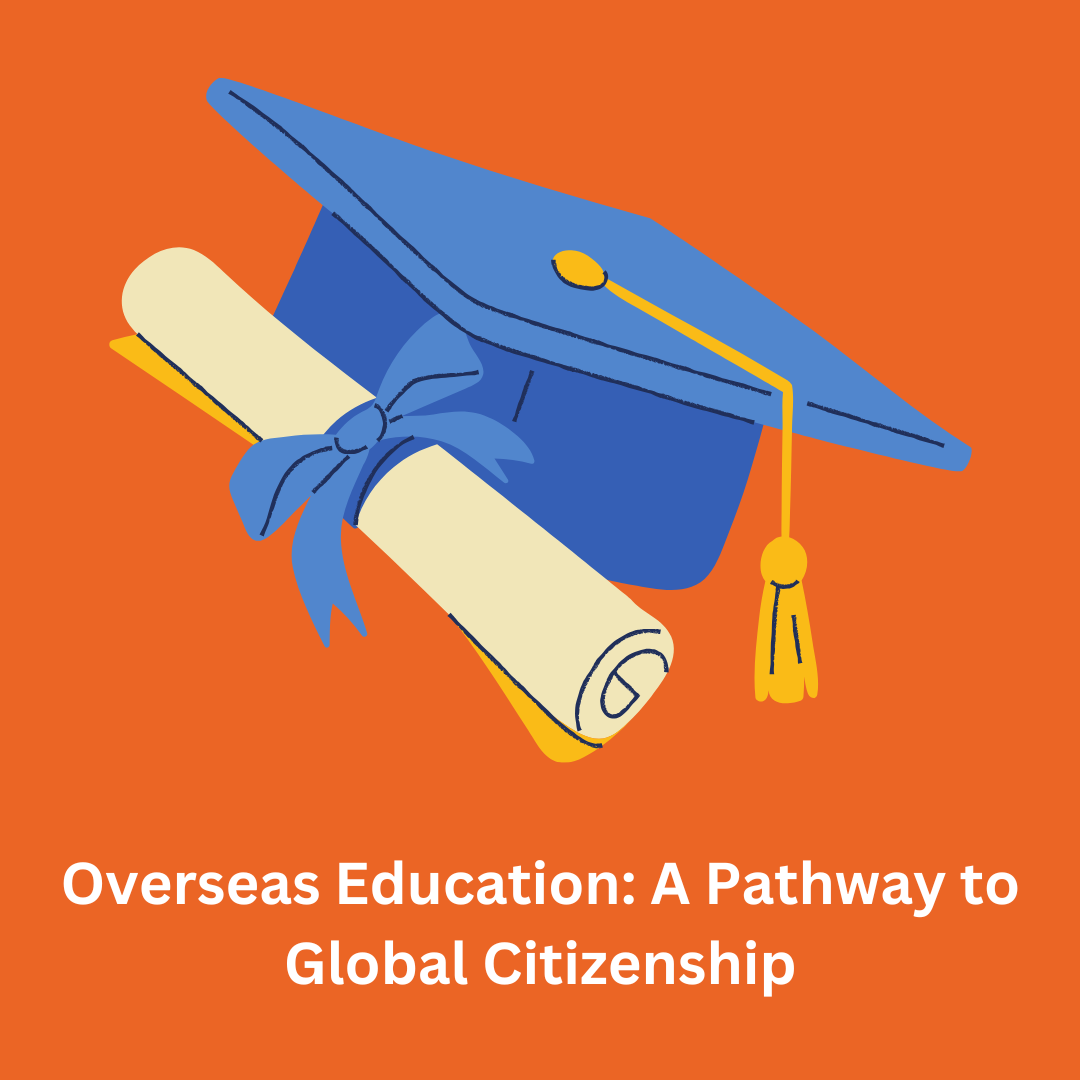Overseas Education: A Pathway to Global Citizenship
In an increasingly interconnected world, the concept of global citizenship has gained significant relevance. As borders blur, both culturally and economically, the skills required to thrive in this global society have evolved. Overseas education offers a transformative experience that equips students with the tools, perspectives, and skills to become true global citizens. By stepping out of their home country, students enter an environment where they not only learn academic content but also gain cultural awareness, adaptability, and a broader worldview.
In this blog, we’ll explore how studying abroad fosters global citizenship, the benefits it brings, and the pathways it opens up for students to contribute to an increasingly globalized society.
What is Global Citizenship?
Global citizenship extends beyond national boundaries, focusing on the interconnectedness of communities, cultures, and economies. It’s about understanding global issues, valuing diversity, and taking responsibility for fostering positive change in the world. Global citizens are informed, empathetic, and engaged in creating a more equitable world.
For students, global citizenship involves cultivating an awareness of their role within the global community. It’s about learning to think and act beyond local or national perspectives, becoming more culturally competent, and gaining the skills to contribute to global solutions.
How Overseas Education Builds Global Citizens
Overseas education is one of the most effective ways to cultivate global citizenship, as it challenges students to adapt, communicate, and empathize with others. Here’s how studying abroad paves the way for global citizenship:
- Cultural Immersion and Awareness
Living in a foreign country immerses students in new cultures, languages, and traditions. This exposure enhances their cultural awareness, teaching them to appreciate diverse perspectives. Students learn the nuances of social interactions in different cultural contexts, making them more empathetic and open-minded. - Expanding Worldviews
Overseas education allows students to step outside their cultural comfort zones and experience diverse viewpoints. Encountering different ways of thinking and problem-solving helps students develop a broader perspective on global issues such as climate change, social justice, and economic development. They learn to see these challenges from multiple angles, fostering a more inclusive worldview. - Language Skills and Communication Proficiency
Whether it’s learning a new language or adapting to different dialects and accents, overseas education builds language skills. Language is a key tool for connecting with others, and students who can communicate across linguistic barriers are better equipped for international cooperation. - Global Networking Opportunities
International campuses attract students from across the world, creating a melting pot of cultures and ideas. Studying abroad allows students to build lifelong friendships and professional networks that cross borders. These connections can be invaluable for future careers, especially in fields where international collaboration is crucial. - Building Independence and Resilience
Moving to a new country requires resilience and adaptability. Students are pushed out of their comfort zones, learning to navigate unfamiliar systems and solve problems independently. This experience cultivates resilience and self-sufficiency, essential traits for global citizens. - Academic and Professional Skill Development
Foreign universities often emphasize skills that are essential in the global workforce, such as critical thinking, collaboration, and creativity. Many programs incorporate global issues into their curriculum, encouraging students to develop innovative solutions that have a far-reaching impact.
Benefits of Becoming a Global Citizen Through Overseas Education
The benefits of studying abroad extend far beyond the academic experience, transforming students into more confident, adaptable, and socially responsible individuals. Here are some ways overseas education supports students on their journey to becoming global citizens:
1. Enhanced Career Opportunities
Employers value candidates who can think globally and work effectively in diverse teams. With firsthand experience in a multicultural environment, students who study abroad stand out as adaptable and culturally competent. Many multinational companies seek employees with a global outlook, making overseas education a valuable asset in today’s job market.
2. Personal Growth and Development
Studying abroad is a profound experience that often leads to increased self-awareness. Navigating the challenges of a foreign environment builds resilience, independence, and problem-solving skills. Students learn to rely on themselves while also reaching out to others, strengthening their sense of self and empathy.
3. Strengthened Social and Cross-Cultural Skills
Living and studying with people from different backgrounds enhances students’ social skills and cultural competence. Global citizens are skilled at bridging cultural gaps, showing empathy, and understanding diverse perspectives. These skills are essential not only for personal relationships but also for leadership roles in international settings.
4. A Broader Perspective on Global Challenges
Exposure to global issues, such as climate change, public health, and poverty, from diverse perspectives fosters a greater understanding of these challenges. Students become motivated to contribute to solutions, often inspiring careers focused on sustainability, social justice, and humanitarian work.
5. Awareness and Appreciation for Diversity
Experiencing cultural diversity firsthand instills a lifelong appreciation for different traditions, beliefs, and values. This cultural empathy helps reduce prejudice and fosters a spirit of cooperation among people from all backgrounds. Global citizens are advocates for inclusivity, making them positive forces for change in society.
Steps to Cultivate Global Citizenship While Studying Abroad
To maximize the benefits of studying abroad, students should actively engage in their new environment. Here are some steps to help students cultivate global citizenship:
- Embrace Cultural Experiences
Participate in local customs, attend cultural events, and try new cuisines. Engaging with the local culture will enrich your experience and deepen your understanding of different ways of life. - Join International Clubs and Organizations
Most universities have clubs and societies focused on global issues, cultural exchange, or social service. Joining these organizations can help you meet like-minded individuals and develop cross-cultural skills. - Volunteer Locally
Volunteering in your host country can be a rewarding way to contribute to the local community and gain insights into societal issues. It’s a powerful way to give back while building meaningful connections. - Stay Informed About Global Issues
Read global news and follow international developments. Understanding global issues such as climate change, migration, and public health can help you make informed decisions and contribute to global solutions. - Engage in Language Learning
Even if your course is taught in English, learning the local language shows respect for the host culture and allows you to connect more deeply with locals. Basic language skills can enrich your experience and broaden your communication skills. - Reflect on Your Experiences
Keep a journal or blog about your experiences, reflecting on what you’re learning and how it’s shaping your worldview. Reflecting on your journey will help you identify your growth and values as a global citizen.
Eclave’s Role in Supporting Future Global Citizens
At Eclave, we believe that overseas education is more than just studying in a new country—it’s about expanding horizons, embracing diversity, and building a sense of responsibility towards the global community. We provide comprehensive guidance for students looking to study abroad, from selecting the right program to preparing for cultural adaptation and building the skills needed for global citizenship.
We understand the transformative power of international education and are dedicated to helping students make the most of this life-changing experience. Whether it’s providing insights on cultural adaptation, offering resources for building global networks, or supporting students in navigating global career paths, Eclave is here every step of the way.
Conclusion: Overseas Education as a Gateway to Global Citizenship
Overseas education is more than academic pursuit; it’s a pathway to becoming a global citizen. As students immerse themselves in new cultures, embrace diversity, and adapt to different ways of life, they develop the skills and mindset to make a positive impact on the world. Global citizens are those who understand their place in the world, respect differences, and work to solve global challenges for the benefit of all.
For students ready to embark on this journey, Eclave is here to provide guidance and support, helping them turn their study abroad dreams into a fulfilling and transformative experience. Start your journey towards global citizenship today—explore the world with Eclave and unlock a future full of possibilities.

